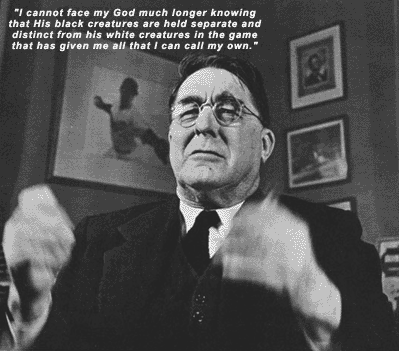Wesley Branch Rickey, born of Ohio stock in 1881, spent an undistinguished career as a major league player and field manager, but there is something historic about the man.
Ethnic prejudice has no place in sports, and baseball must recognize that truth if it is to maintain stature as a national game.""Man may penetrate the outer reaches of the universe, he may solve the very secret of eternity itself, but for me, the ultimate human experience is to witness the flawless execution of a hit-and-run."
Thou shalt not steal. I mean defensively. On offense, indeed thou shalt steal and thou must."
- Branch Rickey
 The forward-looking "Mahatma"
The forward-looking "Mahatma"It was a risky move by Rickey; prejudice was widespread in America. A backlash of negative sentiment was sure to follow. The predicted howl would come, but most baseball club owners took a wait-and-see attitude.
Tremendous pressure was brought to bear on Robinson to succeed. Had he failed to live up to the standards and playing ability of a Major Leaguer, the integration movement might have been set back for years.
Robinson responded by leading the league in stolen bases and earning the first Rookie of the Year award. He would eventually become the first African American to be inducted into the Baseball Hall of Fame. The "Great Experiment," as it was termed, was an unqualified success.
That feat, and a shrewd eye for baseball talent, earned Rickey the revered nickname, "The Mahatma," or guru.
"He (Rickey) could recognize a great player from the window of a moving train," wrote nationally acclaimed sports columnist Jim Murray of the Los Angeles Times.
Rickey the Innovator
Branch Rickey was a free thinker, and devised a number of "gadgets" that helped improve the game and help speed the development of the young talent he was accumulating.
His first development was the forerunner of what is now the Minor League system, with such talent levels as AAA (a notch below the majors), AA, A, Rookie, and Developmental leagues.
In 1919, he took over the St. Louis Cardinals front office as general manager. He began to buy semi-pro teams and stocked them with his own pre-selected talent, thus giving aspiring players a place to hone their skills with help from ex-Major Leaguers, scouts, and managers. His system eventually boasted a network of 32 teams and about 600 players under contract.
Rickey then was able to draw the best talent out of the minors to play for the parent club. He signed and promoted to the big leagues the likes of Johnny "Pepper" Martin, Jay Hanna "Dizzy" Dean and his brother Paul "Daffy" Dean, and Joe "Ducky" Medwick. This talent came together as the "Gashouse Gang," which dominated baseball in the 1930s.
In the early 1940s it was Stan "the Man" Musial, Enos "Country" Slaughter, and Marty "Slats" Marion, the foundation of another juggernaut.
Of course, this didn't escape the watchful eye of Commissioner Kenesaw Mountain Landis, who thought this system of player development upset the balance of talent, and therefore competition, at the Major League level. Based on this premise and wielding his czar-like powers, Landis raided the Cardinal system, twice awarding free agaency to 70 players.
In 1942, Rickey moved on to assume command of the Brooklyn Dodgers. While with the Dodgers, he, along with Minor League director Buzzi Bavasi, set up the first spring training facility in Vero Beach, Florida. They took over a 104-acre plot once used as a civilian small-craft airport, and converted it into the prototype of all Major League facilities. It could be used to gather every Dodger under contract to instruct, evaluate, and assign players at equal levels of ability to the same level in the Minor Leagues.
Rickey also brought to the game the first batting helmets, batting cages, pitching machines, and a string to outline the strike zone for pitchers working on their control.
Waning Years
After such a brilliant career, Rickey was forced out of the Dodger organization in 1950 by owner Walter O'Malley. Rickey was not out of a job long, however. He received a call from the Pittsurg Pirates to help right their listing ship. Nevertheless, the magic, it seemed, was gone. Pirate teams struggled through three straight seasons of 100 lost games (out of 154, at the time).
Rickey stepped down from the Pirates in 1955, but resurfaced in 1959 to preside over a third Major League, the Continental League. The American and National leagues intervened to strike an agreement with Rickey to disband his league, while the majors would expand to 10 teams in each league and play a 162-game schedule. That scheme was implemented in 1961.
In Rickey's later years, he took to public speaking. He visited Columbia, Missouri, in 1965, where he delivered his acceptance speech as an inductee in the Missouri Sports Hall of Fame. He collapsed in the middle of the speech and died a month later.
Rickey was posthumously inducted into the Baseball Hall of Fame in 1967.